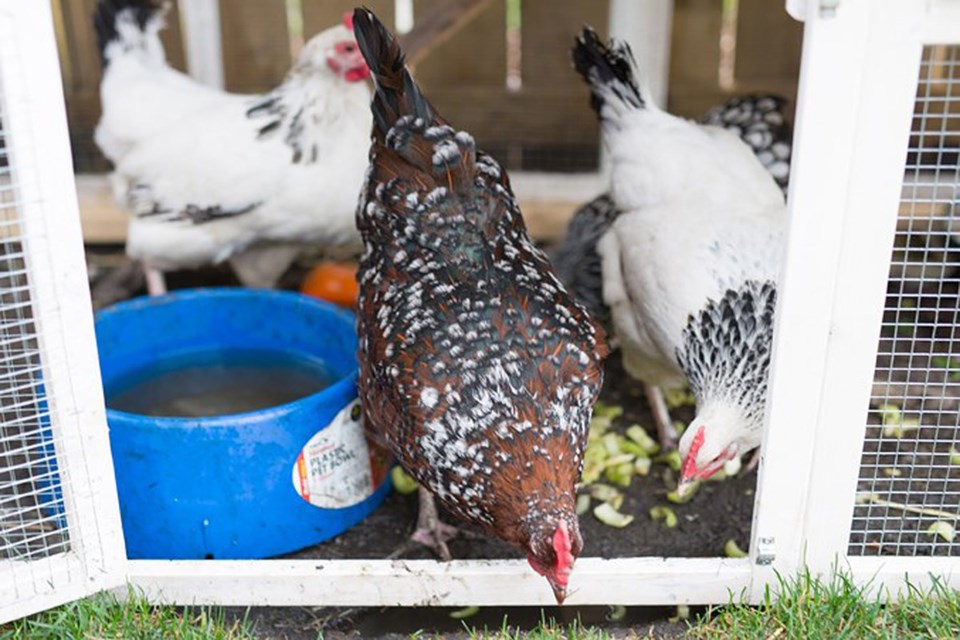INNISFAIL – The rocky road to bring urban chickens to Innisfail took a new twist last week at town council.
Feathery fowl lovers may soon be able to have them as pets under strict conditions through a two-year pilot program without going through a potentially problematic municipal election plebiscite.
If council approves a proposed Urban Hen Pilot Program Bylaw, which is expected to be finalized and tabled in March, chicken-loving citizens wanting fowl as pets may be forced to have approvals signed by neighbours on either side of their homes, and prove to the town they have taken an online urban chicken course on proper urban hen care and coop maintenance practices.
These ideas and others were discussed by town council members after administration presented them with a draft Urban Hen Pilot Program at council’s Agenda & Priorities meeting on Feb. 1.
“At least this way we can say, ‘you got to have a letter saying no objections from your neighbours before you can go ahead and do it’. That addresses the concern people had about it urban hens,” said Mayor Jim Romane, noting objections from two years ago.
“People are worried about the noise and the smell. We are just at the point of letting it go at a trial basis and re-evaluate it."
"Other communities have these approvals in place. I think we can probably make something work," added Romane, who feels there's no need to have a plebiscite.
The report to council outlined the recent history of whether the town should have an urban hen program, which was rebooted last summer by Coun. Don Harrison after being informed there was interest in the community to revive the idea.
A similar urban hen proposal was debated by town council in 2018 but was ultimately and controversially defeated after council rejected the results of a public survey that showed overwhelming support for an urban hen program.
In his report to council, Todd Becker, the town’s chief administrative officer, said it was his recommendation that council either moves toward a pilot project or it doesn’t, adding it might be best not to put the issue to a plebiscite as a pilot project does not have the necessary “level of value” to be put to the community.
“If you did a full project program then maybe, but in my experience urban hen pilot projects, if you decide to put one into play, it is for a period of time to learn from that experience,” said Becker, adding an election ballot is for issues that will have an impact on a community.
“Then you determine, yes we would like to have this project program fully implemented, or we don’t.”
The draft urban hen report to council included a comparison of urban hen pilot projects and permanent program bylaws from several municipalities across the province.
The comparison showed municipalities operating urban hen programs were found to be successful when common regulations and guidelines were in place.
Innisfail’s plan includes:
• limiting the number of hens to between two and six
• limiting the number of available licenses
• prohibiting roosters or chicks
• prohibiting the selling of eggs
• applicants taking an urban chicken course
• fencing requirements, coop construction guidelines
Administration also included “neighbourhood notification”, but it would not have the ability to appeal or veto an application from participating in the pilot program.
Councillors are now insisting it should be mandatory for a successful application and be in writing from neighbours on both sides of the home.
“The bylaw will create people working together. If I want chickens and my neighbour doesn’t, it’s not town council saying yay or nay,” said Harrison. “It’s up to the individual who would like to have two or three hens to have that discussion over the fence.”
Initially, he questioned administration’s recommendation not to go to a plebiscite as there was an “expectation” from the community to do so. However, he later said it was probably for the best as a plebiscite could “pit neighbours against neighbours.
“Whereas this way we have a program and there are some neighbours who don’t mind chickens,” said Harrison.
He added a pilot urban hen program has the potential to be a beneficial educational experience for the community.



